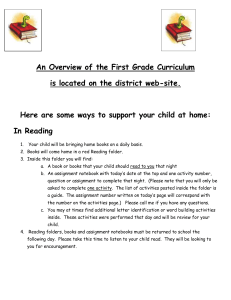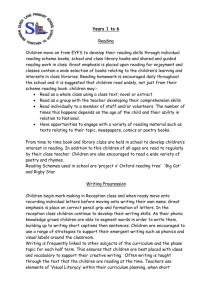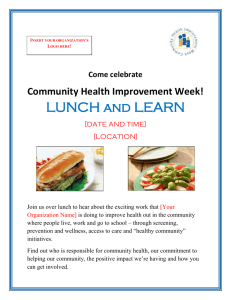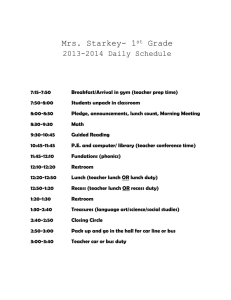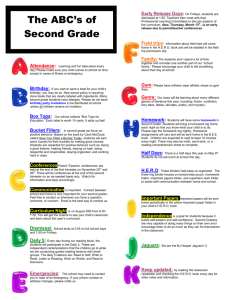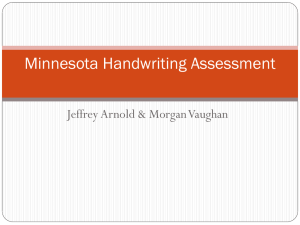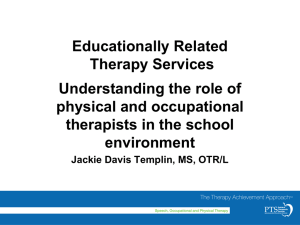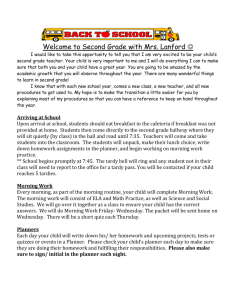2013-2014 First Grade Handbook
advertisement
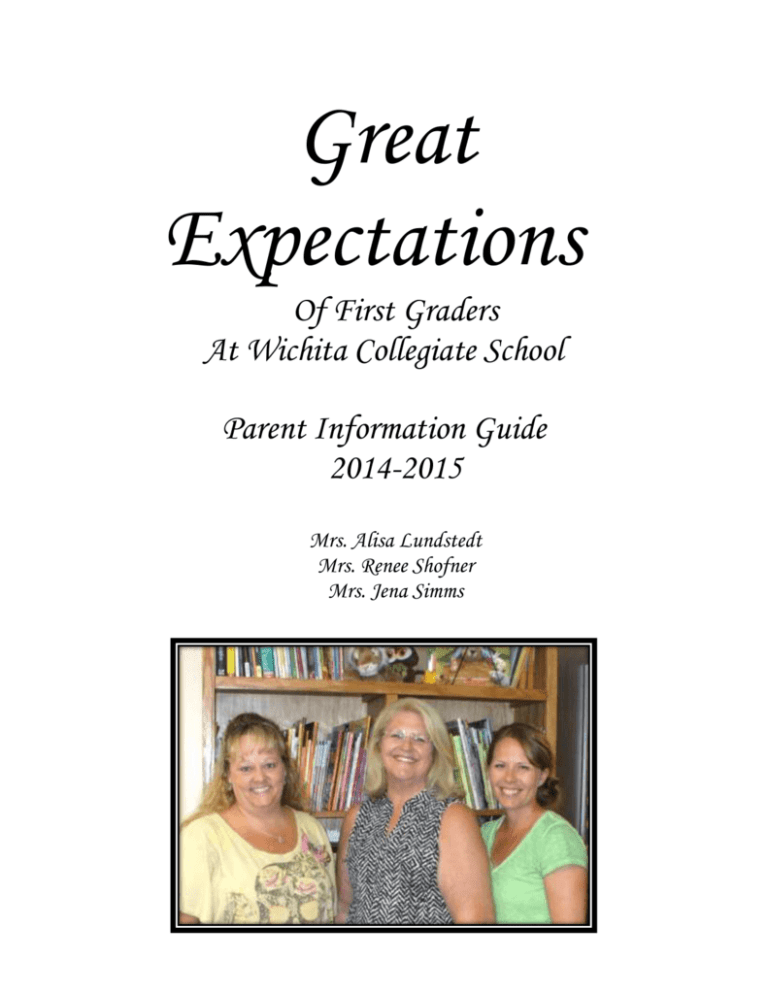
Great Expectations Of First Graders At Wichita Collegiate School Parent Information Guide 2014-2015 Mrs. Alisa Lundstedt Mrs. Renee Shofner Mrs. Jena Simms Parent Information Guide 2014-2015 WELCOME to what we promise will be an exciting and stimulating year for your child and for you! First grade is a time for your child to learn to love school, increase personal responsibilities, find success in their endeavors, and know that teachers and classmates are special friends. In addition to the curricular goals of math, language, science, the arts, and physical education, we are committed to helping students find school an emotionally and intellectually healthy atmosphere where they can strive to reach their full potential. Arrival and Dismissal The doors of our classrooms open at 7:50. This gives the students time to get organized for the day by putting their backpacks away, placing their folders in the appropriate place, beginning their morning activities. Classroom instruction begins at 8:00. Absences and tardies will be recorded for school records beginning at 8:00. Please say good-bye to your child at the door or in the car so that your child can enter the classroom by themselves. We hope you understand that we would love to have a chance to visit with you, but our class will need us in the room to help get their day going smoothly. Students are dismissed at the door and will need a special place where they meet you each day. Students may wait in the hallway or at a designated place outside the building. Dismissal is at 3:00. Students who have not been picked up by 3:15 will go to Kid’s Club, which is held in the lunchroom. When the faculty member who is on crossing guard duty sees children unattended on the school grounds, they will direct them to Kid’s Club when their duties have been completed at 3:15. We know how much you value the safety of your child and would not want your child unattended in front of the school. If your child is absent, please call Amanda Meyers at 771-2251 and she will let us know. Homework will be available to pick up at 3:00 the day of your child’s absence. Behavior Behavior in the classroom is guided to help the child make decisions about actions before they occur, understand consequences of their actions, and to take the responsibility for their actions. The child is also encouraged to interact positively with those around them. First grade teachers have specific programs for their classrooms that help your child attain these goals. Birthdays This is such a special time for students and you are welcome to contact your teacher about a time to send birthday treats to celebrate the occasion. Please limit treats to one snack, and a drink if you wish, without hats or treat bags. It is possible that there may be food allergies in your child’s individual classroom, so please check with your child’s teacher for any specific information. Utensils and paper goods are not available in the classroom, so they must accompany the student’s treats. Enhancement Classes Physical Education Physical Education classes are held two to three times a week. Students must wear tennis shoes to class. Music Vocal music classes are held two to three times a week. Students are expected to attend all concerts. Science Physical, life, and earth science are explored in this class which meets twice a week. French Students are introduced to a variety of activities during French class once each week. Art First graders attend a weekly art class for 1 hour. Positive Steps This is a 30-minute class, every other week, which focuses on self-esteem and decision-making. Library Students visit the library for 30 minutes each week and are introduced to a variety of literature. They will get to check out two books each week: one fiction and one non-fiction. They may check out another book(s) when the previous one(s) have been returned. Computer Students go to the computer lab to work on typing and other computer skills once each week. First grade students have access to computers and iPads in the classroom.. Folders Each child has a take-home folder that has two pockets: one for homework and the other for news and notes from the teacher and the school. Please work with your child to replace the homework in the folder upon completion and bring it to school the following day. This is an important step in helping your child learn life-long independent skills. If you have communications that are to be sent to school, you may place them in your child’s folder. Homework First graders will have daily homework assignments on four days of the week—Monday through Thursday. Please help your child establish a routine at home that will enable them to find an appropriate time to complete the work. The assignment should be put in the homework portion of your child’s folder for school the next morning. Students who don’t return homework may be asked to complete it during another activity at school. Homework assignments will include phonics, spelling, math Homelinks, and Junior Great Books. In addition, a daily habit of reading at home is essential. This includes your child reading to you, and you reading to them, regardless of the child’s reading ability. The comprehension level of students this age far surpasses their reading ability and an adult reading to them introduces them to new vocabulary and models good oral reading. There are read-aloud handbooks at bookstores that can help you choose appropriate literature for students of all levels and interests. The first grade teachers’ policy is not to provide work for students to take with them while they are traveling. However, we will gather work for students when they are absent and will determine when the make-up work is to be completed. Library Books Library books will be coming home with your child and may be returned to the classroom library basket whenever your child has finished. This year, students may check out two books, if they wish, but they must return one book during the following week in order to check out another book. Students are allowed to keep their library books for two weeks at a time. In order to expose the students to a larger body of literature, it is the library’s policy to check out one fiction and one nonfiction book. Again, establishment of routines for this process will be a great benefit to your child. After reading, books should be returned to the backpack. If you, as a parent, would like to go to the library to check out additional books for your child or for you, please take advantage of this opportunity. Library books should stay in the student’s book bag unless they are being read or placed in the basket at school. Language Arts Daily Five The Daily Five is a literacy structure that teaches independence and gives children the skills needed to create a lifetime love of reading and writing. It consists of five tasks that are introduced individually. When introduced to each task, the children discuss what it looks like, sounds like, and feels like to engage in the task independently. Then, the children work on building their stamina until they are successful at being independent while doing that task. The five tasks include: 1. Read to self 2. Read to someone 3. Listen to reading 4. Work on writing 5. Word work (Words Their Way) When all five tasks have been introduce and the children are fully engaged in reading and writing activities, your child’s teacher will work with small groups and confer with children one on one. Spelling Words Their Way is a developmental word study program which allows students to work at an individualized level. Students are given an initial spelling inventory which identifies where each student needs to begin on their word study journey. Each week students will receive a list of words appropriate to their level. Junior Great Books This is an interpretive reading and discussion program. Once a month, children will hear an outstanding piece of literature in the classroom and have it read to them at home. This read-aloud program stresses the enjoyment of literature for its own sake while developing comprehension, interpretive thinking, and oral and written language skills. Oral Language At various times during the year, students will be asked to orally share an item brought from home or tell about a favorite book they have read. This is beneficial in helping students learn to stand up before others and express themselves. Early positive experience with oral language greatly increases a student’s confidence in this area. Oral book reports, drama, and verbalizing literature are other ways that enhance your child’s confidence in this area. Oral language is the basis for reading and writing. Handwriting Without Tears First grade students continue to practice and refine their handwriting skills throughout the year. It is imperative that they correct unusual pencil grips that have become habitual. From first grade on there is a great deal of writing that will be expected from students. An unusual pencil grip tightens muscles in the hands, thus making it difficult for students to do extensive writing projects. Please use homework time as an opportunity to reinforce proper pencil grip. Handwriting Without Tears is the explicit, multisensory handwriting curriculum we use in first grade to teach and develop handwriting skills which are crucial to writing fluency. Daily Sentence Editing Grammatical concepts, such as capitalization, punctuation, tense, etc., will be introduced to students through daily sentence editing. Students will be encouraged to use these rules as they construct sentences later in the year. Poetry We hope that our love of poetry will be contagious. Your child will be learning many poems throughout the year and will be encouraged to share them with you. Lunch First grade students eat lunch at 10:50 A.M. They complete their lunchtime at 11:20 and must learn to budget their time carefully. Monthly menus are posted online from Sage to help your child make appropriate choices. This is the first year of “choices” for your child during lunch and you may want to consistently stress the value of making good choices. Students may also bring their lunches from home and microwave ovens are available for their use. These students will eat in the lunchroom, also, and need to practice opening their own containers that are included in their lunchboxes. Recess follows lunch. Math Our math series is Everyday Math developed by the University of Chicago School of Mathematics Project. The primary program has been developed to stress problem-solving strategies and mathematical concepts. The following quote from Everyday Mathematics expresses our philosophy: “It is perhaps the single greatest goal of Everyday Mathematics that children completing the program acquire number sense. People with number sense have good mental skills, are flexible in thinking about numbers, can use their number and arithmetic skills to solve problems in everyday situations, are familiar with a variety of ways to communicate their strategies, and can recognize unreasonable results when they see them.” It is important to remember that it does not help a child to memorize number facts unless they know how to manipulate numbers in many math situations. The Homelinks that will be a part of your child’s homework are designed to help the student “think” about math concepts, and it is our hope that you will enjoy doing these easy activities with your child. Partners We are extremely honored that you have chosen first grade at Wichita Collegiate School to allow us to share your responsibility for educating your child during this very special time in their lives. We are eager to work with each of you to establish that all-important link between home and school. As we join hearts and hands for this special year, please let us know your joys and concerns. Our numbers are listed here for your convenience: Jena Simms 634-0489 (ext. 452 (h) 789-5859 Renee Shofner 634-0489 (ext. 516) (h) 689-8150 Alisa Lundstedt 634-0489 (ext. 508) (c) 644-5433 Outdoor Education Your child needs to bring appropriate clothing for outdoor activities. Also, first grade teachers will expect students to tie their own shoes and complete the fastenings for their jackets. You may want to take your child with you to the store to purchase their coats to make sure that they can zip, tie, and button. It is recommended that girls and boys wear tennis shoes to school because of recess and PE activities. Please avoid sandals such as flip flops and slides, as stated in our dress code, because of the potential for injury on the playground with these types of footwear. Students in first grade have no need for umbrellas; therefore, please do not bring this item to school. Please refer to the Lower School Handbook for more information. Almost each day, the first graders will spend some time on the track. They are encouraged to walk, run, or jog. A short recess is held after lunch, and (if time) another outside brain break is held in the afternoon. Social Studies Our social studies encompasses home, school, community and broader aspects of our world. Students are encouraged to develop an appreciation for other countries and their cultures. Mystery Reader There will be a variety of special people that will come into the classroom to be the Mystery Reader. The students will not know who this is until their arrival. If you would like to be a reader, we would love to have you or a member of your family.
